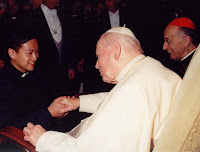 Chillon! thy prison is a holy place,
Chillon! thy prison is a holy place, And thy sad floor an altar - for ‘twas trod,
Until his very steps have left a trace
Worn, as if thy cold pavement were a sod,
By Bonivard! May none those marks efface!
For they appeal from tyranny to God.
These days as I struggle over jet lag, scenes from my two weeks’ journey flash before me. Naturally, what remains are the unforgettables, the high moments, so to say, the human experiences that really matter.
Last August 24, as we took a break from our Societas Ethica conferences, we the participants were taken for a tour in some significant places around Leysin. Our first stop struck me: a visit to Château de Chillon, near
In our walk through the dungeons of the castle, I got fixated on the name of the English poet Byron etched deeply on one of the pillars. It was haunting and our guide told us that he was one of the visitors of the castle who was profoundly struck by the story of the place especially, that episode of Bonivard, the most celebrated among the prisoners of Chillon, that he wrote a sonnet, and then a later, a longer poem.
And likewise I am struck by his act: not so much the etching of his name but the writing of poetry to celebrate emotion—in this case, anguish for the suffering of a prisoner. It was an act that has immortalized the place, nay more, that has proclaimed to the world the sanctity of the walls wonderfully lit by the sunlight reflected by the dancing waters of the lake. It was this kind of light that shone on all the prisoners that have passed Chillon, on all the visitors including Byron, and including my own poor self.
In every place, through every moment: let us leave a memory, an etched name—not on stone but in lucid eulogy—in rimes, in artifacts, or even in the kind act of sharing: in human hearts.
(photo: a quiet moment in one of Chillon's rooms)

1 comment:
I like the last statement you said, especially in people's hearts, like being special to someone, to love others.
Post a Comment